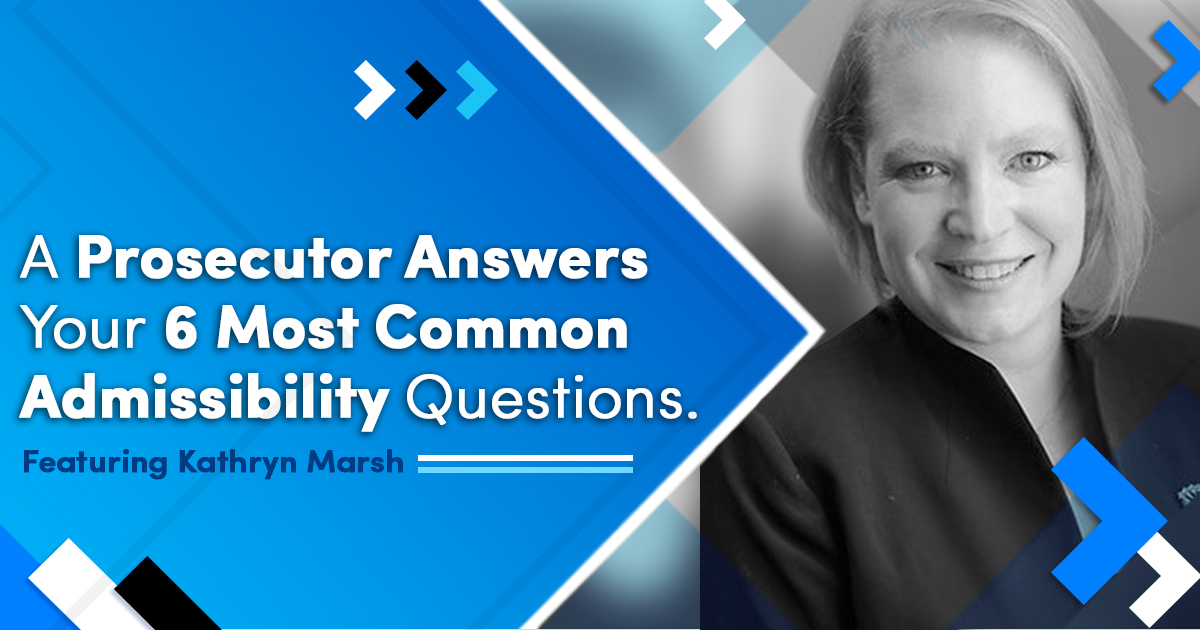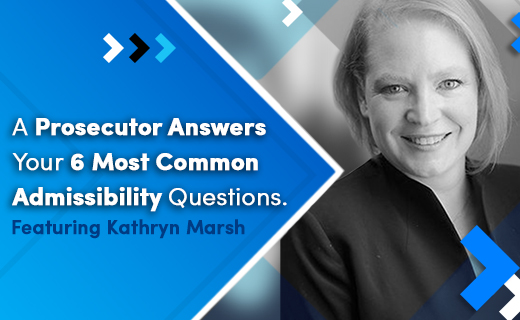
A Prosecutor Answers Google’s Top 6 Admissibility Questions
In part 1 of this series, our VP of Marketing, Jessica Wein spoke with Kathryn Marsh, an Assistant Chief of the Special Victim’s Unit and Legislative Policy Co-Chair at the Office of the State’s Attorney for Prince George’s County in Maryland. Kathryn answered questions about her role as a prosecutor during COVID-19.
In part 2, Kathryn answers Google’s 6 Most Common Asked Admissibility Questions. See below for her answers.
Questions
Bonus Question
Jessica: Who is the granter when recording a court order?
Kathryn: A judge always makes the decision on a court order, so they’re technically who grants or denies it. Either side can petition for one. In the criminal world, we’ll call it the state or the government and the defendant. In the civil world, we’ll call it the petitioner and the defendant.
Jessica: Can a recording made in secret be used in court?
Kathryn: That varies based on jurisdiction. Some states are a one-party consent state saying that only one side needs to be aware of the recording. If you’re in a one-party state, then yes because clearly someone knows it’s being recorded. Some states are two-party meaning both sides have to consent to the recording for it to be used. You have additional exceptions for two-party consent cases if police are investigating certain kinds of crimes. If they’re investigating murder crimes, murder for hire, rape, child abuse, certain drug dealing crimes, they’re allowed to do one-party recordings. Or undercover officers can be wired up and those can be used. The US is split between those two different types of jurisdictions.
Jessica: How long are recordings required to be retained by the court?
Kathryn: This will vary as well. If a person is found not guilty of a crime, they have the right to file for expungement. If the court grants the expungement, every record of that crime must be destroyed because it’s as if it never happened. That’s one caveat to retention of recordings: I believe best practice is if a person is convicted of a crime, the evidence should be maintained as long as the person is still serving the sentence or on probation for the crime because the defendant will still have appeal rights. If somebody wins an appeal, they have to participate in another trial so you can’t destroy evidence. If someone is still serving probation, they still have rights to post conviction hearings because they’re still suffering the effects of the crime, so you don’t want to destroy evidence. For me, if it’s any serious felony, I tell them never to destroy it. They will always have a right to challenge their conviction and that evidence needs to be maintained to keep the integrity of the case.
Jessica: What makes a recording inadmissible in court?
Kathryn: When you’re talking about suspect interviews, the 5th and 6th amendments are most often the legal arguments to the actual suppression of the suspect’s statement. A secret recording could suppress a witness’s statement because if it was illegally obtained, I can’t use it. Any Miranda violation, forcing or making threats, compelling or intimidation to get the statement isn’t allowed. The 5th amendment is saying that you can’t be compelled to be a witness against yourself at trial. That’s where you have the right to remain silent. So, you have to agree to waive that right in order to talk to the police.
The 6th amendment includes your right to counsel. If you’ve hired an attorney and law enforcement goes to take a statement from you and they don’t allow you to consult with your attorney or have your attorney present (and you already have one), that too would make it so the statement was suppressed. Which is why your Miranda warnings state “you have the right to remain silent, anything you say can be used against you, you have the right to an attorney, if you don’t have an attorney, one can be provided for you”. An individual has to sign and waive their rights in order to make a statement. If they don’t do that, and the person’s in custody and is being interrogated by law enforcement, that interview is going to be suppressed.
Jessica: How do you verify the identification of a person on an audio recording?
Kathryn: As a piece of evidence, you have to have somebody who can attest or swear under oath to a jury that it’s the person and they know it is. If somebody has personal knowledge and says they can identify their voice, then they can be a witness for the trial. I can’t personally attest to anybody’s voice, that’s what we have a witness for. Or sometimes you can identify the individual from the context of the statement.
Say it’s an embezzlement case containing two parties and there’s a recording where one person is saying “ok, put it in this account, here’s the password to that” and I can show that the account belongs to this person and they’re the ones who created the password; by context I can show who it is.
Jail calls are a big piece of evidence because they’re recorded all across the country. Callers have to put in the pin number that they’re given at the jail. We’ll have a witness that will recognize their voice, or from the context, if they’re talking about all the evidence in the case, that’s only given to the defendant in the jail as we don’t give someone’s evidence to another defendant.
So those are some of the ways you can verify an audio recording. We prefer video recordings all the time and its protections for everybody because if you have a police officer who’s taking a statement from somebody, we’ve got to show: 1. If they’re in custody, that Miranda was complied with, 2. There were no promises, threats or inducement or force to get that statement. If you have just audio and the defendant takes the stand and says “Hey, this guy told me before he started the recording that if I didn’t do this he was going to make sure my kids were placed in foster care”, or “they slammed me into the wall” or anything like that, it could be a question in a jurors mind. By everything being on video from the second they walk into the room, (before they start anything) the jury has the ability to see everyone’s demeanor. Are the police officers intimidating or threatening? Are they aggressive in how they’re asking the questions? Or is it a really laid-back interview? Did the defendant’s body language or demeanor change when they started questioning him or her about other things? You can read into that. Are they really relaxed until you start asking them about the crime? Does their leg start shaking? Do they start sweating? Ideally, I much prefer video recorded statements but if audio is all I got, audio’s all I got.
Jessica: Other than reading the Miranda rights, do LEOs have to say anything else before the recording to ensure it’s admissible?
Kathryn: Miranda only applies if they’re in custody. If you’re interviewing somebody who, at the time you believe is a witness and they’re not arrested or in custody, it’s most likely a voluntary statement. If that same individual later becomes a suspect, after the statement was given, they didn’t have to have Miranda read to them. It’s only if they’re in custody and they’re not free to leave. Voluntary statements can always be used without Miranda.
The government provides all evidence to the defense attorney. Even if we aren’t planning to use it, We give every piece of evidence we give them. The defense attorney will then file motions to suppress evidence. That’s not to say there are times that I’ve heard a statement and I have realized I can’t use it because sometimes a police officer may make a misstatement about the law, I still provide the statement and let the defense attorney know I won’t be admitting the statement.
For example, there’s a couple of different ways sex offense crimes can happen. If a police officer makes a misstatement to the suspect where they believe, “hey, if I admit to that, it’s not a crime” anything up until that misstatement of law, I can use. Anything afterwards, I cannot.
What is MaestroVision’s Role in the Conviction Process?
At MaestroVision, we strive to provide resources for entities that demand justice for victims and witnesses. We understand that when it comes to submitting evidence, the quality of your recording is of the utmost importance. Our interview recording software was built with broadcast quality video capture ensuring suspect, victim and witness statements are clearer than ever to ensure that the conviction process runs smoothly for law enforcement, child advocacy centers.


